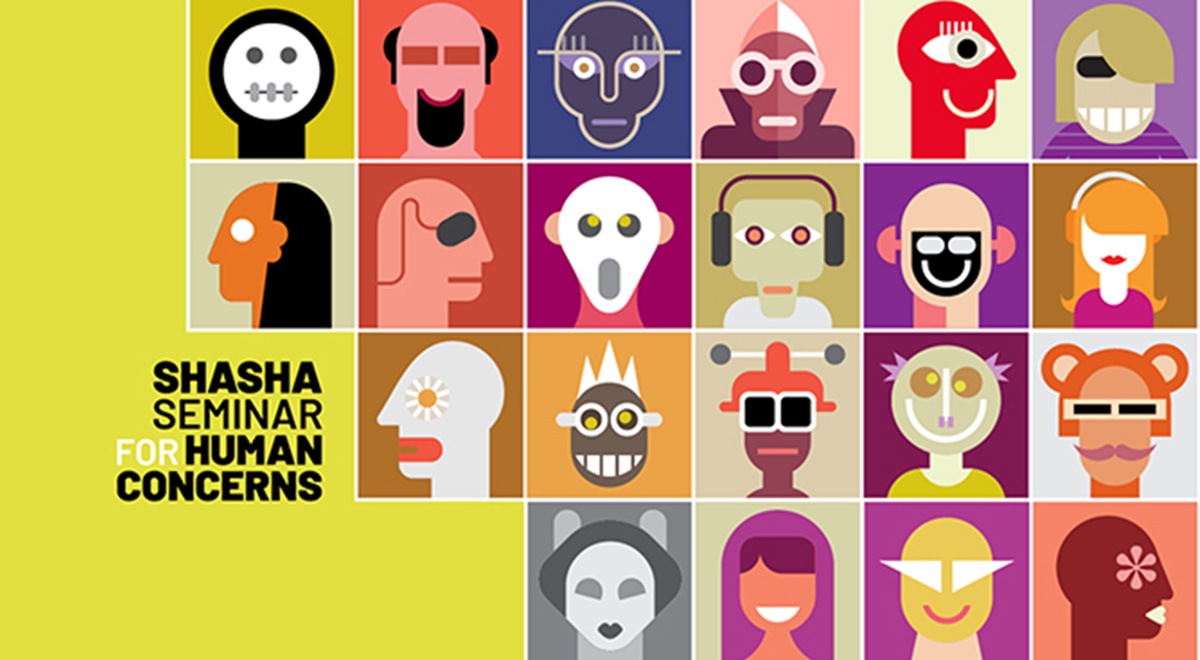Artificial Intelligence Explored in Shasha Seminar for Human Concerns

Artificial intelligence is a disrupter the likes of which humanity has never seen before. It can magnify existing societal evils, but also offers students unique educational opportunities. It can both replace human knowledge and offer unprecedented opportunities to capture and harness it. It’s seemingly inevitable; it must be regulated.
What was clear from the conversation at the Shasha Seminar for Human Concerns, held Nov. 10 and 11, is that the rapid rise of artificial intelligence represents an inflection point for humanity. Groups of experts from a variety of fields came together at the seminar to talk about “Artificial Intelligence or Artificial Consciousness.”
Professor of Art Tula Telfair conceived of the seminar’s format—a series of informal panel discussions where experts opined on the broad subject through the lens of their individual disciplines. Each session began with the panelists’ definitions of consciousness and a prompt from Telfair. Once launched, the conversations took wide-ranging and often surprising turns.
The sessions were broadly constructed to touch on the following topics: expanding horizons of awareness and invention and progress; authorship and legacy, bias and discrimination, justice, and sustainability; creativity, identity, and human rights; and policy, economics, and oversight.
“Creation is now about collaging and editing … it’s not really about invention,” Telfair said, during one of the panel discussions.
“What is the technology trying to tell us about ourselves?” said Jacob Ward ’96, a correspondent for NBC News covering the intersection of technology, human behavior, and social change. “That is what I keep coming back to.”
Over the course of the day, definitions of consciousness ranged from the poetic to the technical. “Consciousness is looking into my loved ones’ eyes and, without words, inferring both the present and the past,” said Wesleyan’s Dean of Natural Sciences and Mathematics Martha Gilmore.
“Consciousness is the capacity to absorb the world beyond oneself,” said Hong Qu ’99, an engineer.
“Consciousness is about creating or enabling the conditions for human beings to live meaningful and fulfilling lives,” said James Cavallaro, a human rights lawyer and executive director of the University Network for Human Rights.
The conversation ranged broadly on what AI should and shouldn’t do, and how its adoption will change human behavior, particularly in the realm of work. “What is the value of a human being aside from what they do in a day?” Ward said.
There were those that expressed concern that use of AI would trump human judgment and increase polarization in a society already wrestling with that problem. “The wisdom of our democracy comes from the collision of different ideas,” said U.S. Senator Michael Bennet ’87, Hon. ’12, P’27.
Christopher Weaver MALS ’75, CAS ’76, a computer scientist and game inventor, said that AI doesn’t dwell in the realm of poetry or emotion. It’s a “brute force” that “never forgets,” he said. But he believes that can be a benefit, allowing for the chance to tackle big ideas and problems with a ferocity the human mind could not replicate on its own.
The question of regulation of the tool was an important part of the second panel’s discussion. Rashida Richardson ’08, an attorney and assistant professor of law and political science at Northeastern University, pointed out that data isn’t historical and objective. If you feed AI biased information, the results will reflect that. The technology will amplify the structural inequalities in society, she said. “What are the societal consequences of that?” Richardson said.
If there was a broad sentiment amongst the panelists, it was expressed by Weaver: “I don’t want the benefit misused. I want the benefits of AI, not the negatives,” he said.
The Shasha Seminar is an educational forum for Wesleyan alumni, parents, and friends that provides an opportunity to explore issues of global concern in a small seminar environment. Endowed by James Shasha ’50, P’82, the Shasha Seminar for Human Concerns supports lifelong learning and encourages participants to expand their knowledge and perspectives on significant issues.

